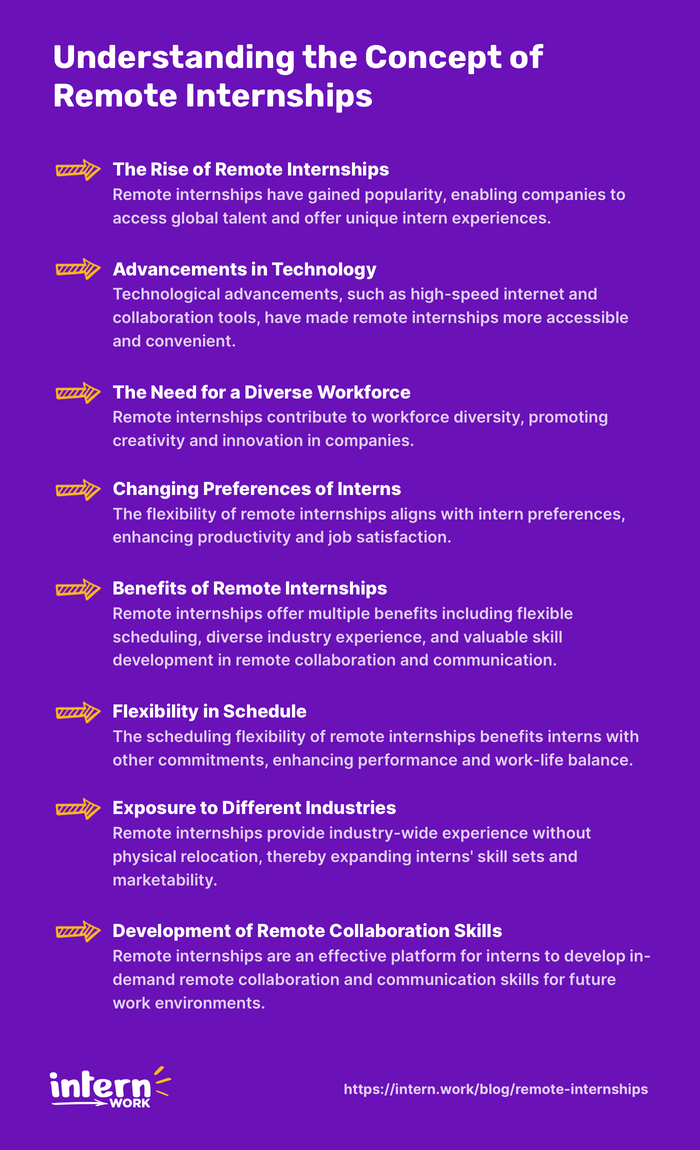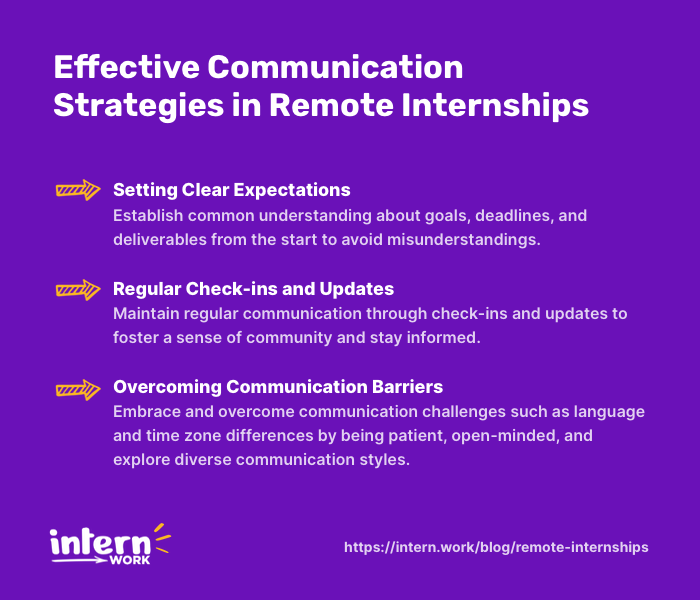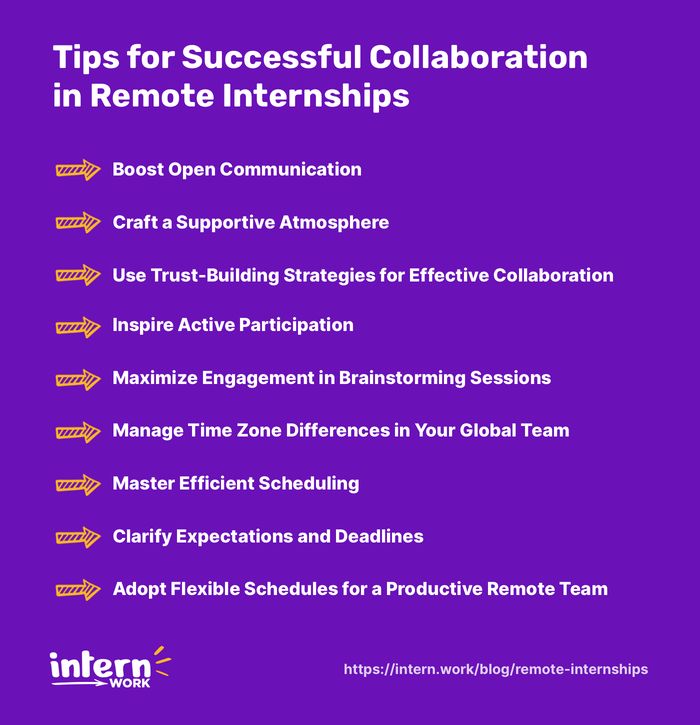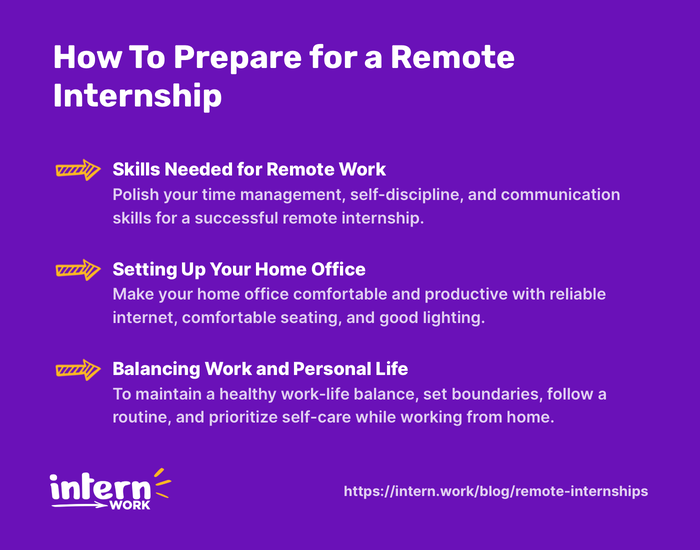
Remote internships have become increasingly popular in recent years, offering unique opportunities for collaboration and communication. In this article, we’ll explore the concept of remote internships, discuss the essential tools for remote collaboration, delve into effective communication strategies, provide tips for successful collaboration, share case studies of successful remote internships, and offer advice on preparing for a remote internship. So, grab your favorite beverage, get comfortable, and let’s dive into the world of remote internships!
Understanding the Concept of Remote Internships
Remote internships can be completed from anywhere, as long as you have a reliable internet connection. They have gained popularity due to the flexibility they offer to both interns and employers. Gone are the days of commuting to the office and squeezing into tiny cubicles!
-
The Rise of Remote Internships
In recent years, remote internships have significantly increased popularity among companies of all sizes. This trend is fueled by several factors, including technological advancements, the need for a diverse workforce, and the changing preferences of interns themselves. Embracing remote internships allows companies to tap into talent from around the world and offer unique experiences to interns.
-
Advancements in Technology
Technological advancement is one of the key drivers behind the rise of remote internships. The availability of high-speed internet connections, collaboration tools, and video conferencing software has made it easier than ever for interns to work remotely. With just a laptop and an internet connection, interns can now connect with their supervisors and colleagues from different locations, making the intern experience more accessible and convenient.
-
The Need for a Diverse Workforce
Companies today recognize the importance of diversity in their workforce. Remote internships allow companies to tap into talent from various backgrounds and locations. By embracing remote internships, companies can create a more inclusive and diverse work environment, fostering creativity and innovation.
-
Changing Preferences of Interns
Interns today have different preferences when it comes to their work arrangements. Many prefer the flexibility and freedom that remote internships offer. Remote internships allow interns to work from the comfort of their own homes, eliminating the need for relocation or long commutes. This flexibility enables interns to balance their personal and professional commitments better, resulting in increased productivity and job satisfaction.
-
Benefits of Remote Internships
Remote internships bring a plethora of benefits to both interns and companies. For interns, they provide the flexibility to work on their own schedule, gain experience from different industries, and eliminate the need for relocation. They also offer an opportunity to develop valuable skills in remote collaboration and communication, which are increasingly in demand in today’s digital world.
-
Flexibility in Schedule
One of the significant advantages of remote internships is their flexible work schedules. Interns can choose to work during their most productive hours, allowing them to optimize their performance and achieve a better work-life balance. This flexibility is particularly beneficial for interns with other commitments, such as attending classes or taking care of family responsibilities.
-
Exposure to Different Industries
Remote internships allow interns to gain experience in different industries without needing physical relocation. Interns can work for companies in other cities or countries, exposing them to diverse work cultures and practices. This exposure broadens their horizons and helps them develop a well-rounded skill set, making them more marketable in the job market.
-
Development of Remote Collaboration Skills
In today’s digital world, remote collaboration and communication skills are highly valued by employers. Remote internships provide interns with the opportunity to develop and hone these skills. Interns learn how to effectively communicate and collaborate with colleagues and supervisors through various online platforms, such as video conferencing, project management tools, and instant messaging. These transferable skills can be applied in future remote or hybrid work environments.
For companies, remote internships offer a wider pool of talent, as they are open geographically. They can tap into the best talent regardless of location and benefit from fresh perspectives and ideas. Remote internships also allow companies to reduce overhead costs associated with physical office spaces and equipment, making them cost-effective.
Embracing remote internships benefits interns and companies and contributes to the overall transformation of the traditional workplace. As technology advances and the demand for flexible work arrangements increases, remote internships will likely become even more prevalent.

Remote internships are popular due to their flexibility and accessibility. Benefits include flexible schedules, industry exposure, and remote collaboration skills. Companies gain access to a broader talent pool and cost savings.
Essential Tools for Remote Collaboration
Collaboration is the heart and soul of any internship, whether remote or traditional. In a remote setting, having the right tools becomes even more crucial. Let’s explore some essential tools for remote collaboration:
-
Project Management Tools
Project management tools are indispensable to stay organized and keep everyone on the same page. Tools like Trello, Asana, or Monday.com provide a platform to assign tasks, track progress, and ensure smooth workflow.
Effective project management is essential for remote internships. With the rise of remote work, project management tools have become increasingly popular and necessary. These tools help teams stay organized and enhance productivity and efficiency. They provide a centralized platform where interns can assign tasks, set deadlines, and track progress. Additionally, project management tools often offer features such as task dependencies, file attachments, and comment sections, which facilitate seamless collaboration among team members.
-
Communication Platforms
When face-to-face interactions are limited, communication platforms become the lifeline of remote internships. Slack, Microsoft Teams, or Google Meet allow teams to chat, make video calls, and collaborate seamlessly.
Clear and effective communication is crucial for successful remote collaboration. Communication platforms play a vital role in bridging the gap between team members who are physically distant. They provide a space for interns to exchange ideas, ask questions, and share real-time updates. With features like instant messaging, video conferencing, and screen sharing, communication platforms create a virtual office environment, fostering collaboration and teamwork.
-
File Sharing and Cloud Storage
Sharing documents and files is a breeze with cloud storage platforms like Google Drive, Dropbox, or OneDrive. These tools ensure everyone can access the necessary files, regardless of location.
Efficient file sharing and cloud storage are essential for remote internships. These platforms eliminate the need for physical file transfers and enable interns to access documents from anywhere. Cloud storage platforms facilitate seamless collaboration and document management with features like file versioning, document commenting, and file permissions. Interns can work on the same files simultaneously, ensuring everyone is on the same page and reducing the risk of version control issues.
Project management tools like Trello and Asana keep teams organized and productive. Communication platforms such as Slack and Microsoft Teams enable real-time collaboration through messaging and video calls. Cloud storage platforms like Google Drive and Dropbox ensure easy file sharing and access from anywhere.
Effective Communication Strategies in Remote Internships
Clear communication is the cornerstone of successful remote collaboration. Here are some strategies to enhance communication in your remote internship:
-
Setting Clear Expectations
From day one, ensure everyone is on the same page regarding goals, deadlines, and deliverables. Clearly define expectations and provide regular updates to ensure clarity.
-
Regular Check-ins and Updates
Consistent communication is critical in a remote internship. Regular check-ins and updates via video calls or chat help maintain a sense of community and keep everyone informed about the progress of projects.
-
Overcoming Communication Barriers
Remote internships may have their fair share of communication barriers, such as language differences or time zone variations. It’s essential to be patient and understanding and approach challenges with an open mind. Embrace different communication styles and explore ways to bridge any gaps.
Optimizing Communication in Remote Internships
One way to enhance communication in remote internships is by utilizing technology tools specifically designed for remote collaboration. These tools help streamline communication processes and ensure everyone is on the same page. For example, project management software allows interns and supervisors to track progress, assign tasks, and communicate project-related matters in one centralized platform.
In addition to using technology tools, it is crucial to establish a clear and consistent communication schedule. This includes setting regular meeting times, whether daily, weekly, or biweekly, to discuss ongoing projects, address any concerns, and provide updates. With a predetermined schedule, interns and supervisors can plan their work accordingly and allocate time for effective communication.
Another strategy to enhance communication in remote internships is by promoting active listening. This involves giving full attention to the person speaking, asking clarifying questions, and summarizing what has been discussed to ensure understanding. Active listening helps avoid misunderstandings and fosters a sense of trust and respect among team members.
Building Connections and Promoting Transparency
Furthermore, it is essential to encourage open and transparent communication in remote internships. Interns should feel comfortable expressing their thoughts, concerns, and ideas, while supervisors should provide constructive feedback and guidance. Creating a safe and inclusive communication environment fosters collaboration and innovation.
Remote internships often require written communication, such as emails, instant messages, or project documentation. Attention to written communication’s tone, clarity, and professionalism is crucial. Using clear and concise language, avoiding jargon, and proofreading messages before sending them can prevent misinterpretations and ensure effective communication.
Lastly, building rapport and fostering connections among team members is essential in remote internships. Encouraging informal conversations through virtual coffee breaks, team-building activities, or online social events can create a sense of camaraderie and strengthen relationships. These interactions improve communication and promote a positive and engaging remote internship experience.

Clear communication is essential in remote internships. Set clear expectations, maintain regular check-ins, and overcome communication barriers. Utilize technology tools and establish a consistent communication schedule.
Tips for Successful Collaboration in Remote Internships
Now that we’ve covered the essentials, let’s dive into some tips for successful collaboration in your remote internship:
-
Building a Strong Remote Team
Encourage open communication, foster a supportive environment, and organize team-building activities. Building a solid remote team is crucial for successful collaboration in a virtual internship. Since you can’t meet in person, it’s essential to establish a culture of open communication where team members feel comfortable sharing their thoughts, ideas, and concerns. This can be done through regular video calls, instant messaging platforms, or project management tools.
Additionally, fostering a supportive environment is essential for remote internships. Encourage interns to support and help each other, creating a sense of camaraderie even though they are physically apart. This can be achieved by implementing virtual coffee breaks, team challenges, or even virtual team-building activities.
Building trust among team members is another critical aspect of successful collaboration in remote internships. Since you can’t rely on in-person interactions, it’s crucial to establish trust through consistent and transparent communication. This can be achieved by setting clear expectations, providing regular feedback, and recognizing individual contributions.
-
Encouraging Active Participation
In a remote setting, it’s easy to feel disconnected or hesitate to participate actively. However, encouraging interns to actively participate is vital for a successful collaboration. Actively participating allows interns to contribute their unique perspectives, ideas, and insights to the team.
A supervisor or team leader must create an inclusive environment where everyone feels comfortable sharing their thoughts and opinions. This can be done by actively seeking input from all team members, encouraging interns to share their ideas, and asking for feedback on various projects or tasks.
Creating opportunities for interns to engage in discussions and brainstorming sessions is crucial. This can be done through virtual meetings, where interns can ask questions, provide suggestions, and contribute their thoughts. By creating a collaborative atmosphere, interns will feel valued and motivated to actively participate.
-
Managing Time Zones and Schedules
Time zones can be tricky, primarily when interns are located in different parts of the world. However, with proper planning and flexibility, overcoming this challenge and ensuring a harmonious collaboration is possible.
When scheduling meetings or setting deadlines, it’s important to consider everyone’s availability. This may require adjusting meeting times to accommodate different time zones or finding a time that works for everyone. By being mindful of time zones, you can ensure that all team members have equal opportunities to participate and contribute.
Additionally, it’s essential to establish clear communication regarding expectations and deadlines. Providing interns with a shared calendar or project management tool can help them stay organized and aware of upcoming tasks or deadlines. This way, everyone can plan their work accordingly and avoid confusion or delays.
Flexibility is vital in managing time zones and schedules. Interns may have personal commitments or different working hours due to their location. Understanding and accommodating can foster a positive and productive collaboration among team members.

Successful collaboration in a remote internship requires building a solid team through open communication, support, and team-building activities. Encourage active participation by creating an inclusive environment where interns feel comfortable sharing their ideas and insights.
Preparing for a Remote Internship
Before you embark on your remote internship journey, here are some key considerations:
-
Skills Needed for Remote Work
Remote internships require specific skills beyond the technical competence in your chosen field. Time management, self-discipline, and strong communication skills are crucial in a remote setting. Make sure you polish these skills before starting your remote internship.
-
Setting Up Your Home Office
Your home office is now your workspace, so make it comfortable and conducive to productivity. Ensure you have a reliable internet connection, a comfortable chair, and proper lighting to create an ideal work environment.
-
Balancing Work and Personal Life
Working from home can blur the lines between work and personal life. Set boundaries, establish a routine, and make time for self-care. Remember, a healthy work-life balance is essential for success and well-being.

Consider the skills needed for remote work: Time management, Self-Discipline, and Strong Communication. Create a comfortable and productive home office. Set boundaries and establish a routine to maintain a healthy work-life balance.
Key Takeaways
- Remote internships are all the rage these days, offering a compelling blend of freedom and flexibility for interns and employers. Say goodbye to dreary commutes and cramped cubicles – now you can work from anywhere with a reliable internet connection!
- The surge in remote internships is propelled by rapid technological advancements. With lightning-fast internet, nifty collaboration tools, and video conferencing software at your fingertips, working remotely has never been easier. All you need is a trusty laptop and an internet connection, and voila!
- Companies are waking up to the power of diversity in their workforce, and remote internships provide the perfect opportunity to tap into talent from all walks of life.
- Today's interns crave flexibility and freedom; remote internships deliver just that. Forget about uprooting your life or enduring endless commutes. With remote internships, you can work in your pajamas from the cozy comfort of your own home.
- Remote internships bring a treasure trove of benefits for both interns and companies. As an intern, you'll enjoy the freedom to craft your own schedule, gain exposure to diverse industries without relocating, and develop valuable remote collaboration and communication skills – all of which are like golden tickets in today's digital landscape.
- To conquer the challenges of remote collaboration, you'll need the right tools in your arsenal. Enter project management tools like Trello and Asana, the superheroes of organization. They'll help you keep track of tasks, deadlines, and progress, ensuring a seamless workflow that would make even the Avengers proud.
- When face-to-face interactions are scarce, communication platforms become your lifeline. Picture Slack, Microsoft Teams, and Google Hangouts Chat as your trusty sidekicks, always there to save the day. They let you chat, make video calls, and collaborate effortlessly, bridging the physical divide and creating a virtual haven for teamwork.
- Master the Art of Communication: Clear communication is the secret ingredient to remote collaboration success. From setting crystal-clear expectations and regular check-ins to overcoming language barriers and time zone quirks, you'll need to be a master communicator.
- Building a robust remote team is like assembling a league of extraordinary individuals. Encourage open communication, foster a supportive environment, and organize virtual team-building activities to forge unbreakable bonds.
Wrapping Up
Remote internships offer incredible opportunities for collaboration and communication. With the right tools, effective communication strategies, and a supportive team, remote internships can be a rewarding experience for both interns and employers.






